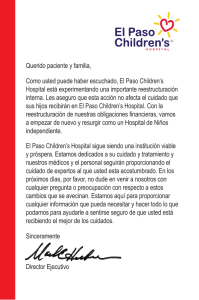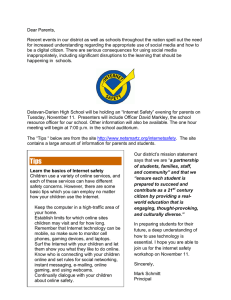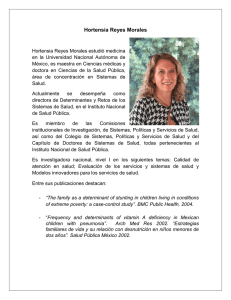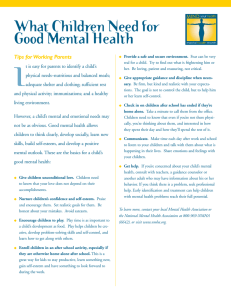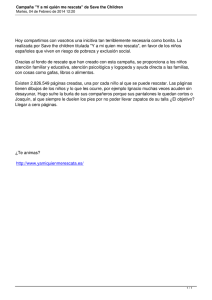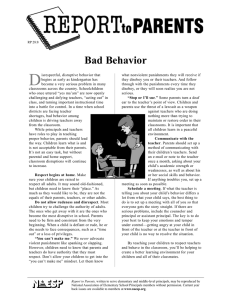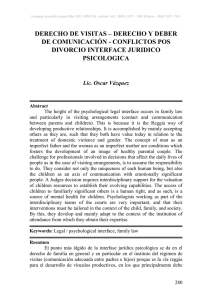What to Say and Do for Your Children
Anuncio
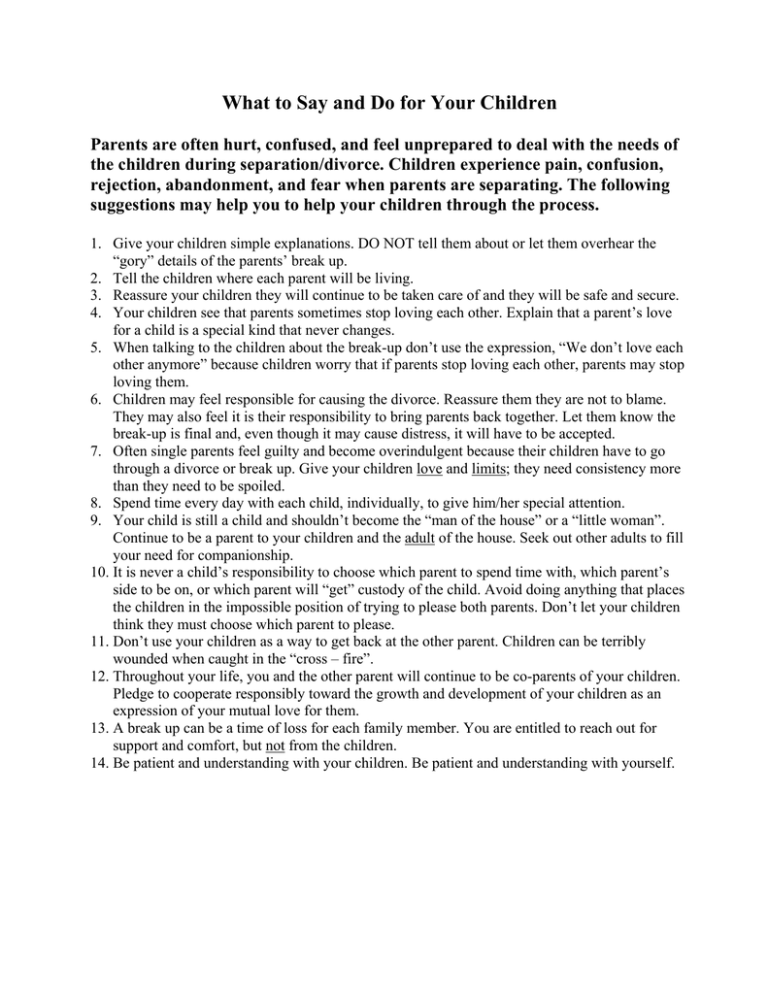
What to Say and Do for Your Children Parents are often hurt, confused, and feel unprepared to deal with the needs of the children during separation/divorce. Children experience pain, confusion, rejection, abandonment, and fear when parents are separating. The following suggestions may help you to help your children through the process. 1. Give your children simple explanations. DO NOT tell them about or let them overhear the “gory” details of the parents’ break up. 2. Tell the children where each parent will be living. 3. Reassure your children they will continue to be taken care of and they will be safe and secure. 4. Your children see that parents sometimes stop loving each other. Explain that a parent’s love for a child is a special kind that never changes. 5. When talking to the children about the break-up don’t use the expression, “We don’t love each other anymore” because children worry that if parents stop loving each other, parents may stop loving them. 6. Children may feel responsible for causing the divorce. Reassure them they are not to blame. They may also feel it is their responsibility to bring parents back together. Let them know the break-up is final and, even though it may cause distress, it will have to be accepted. 7. Often single parents feel guilty and become overindulgent because their children have to go through a divorce or break up. Give your children love and limits; they need consistency more than they need to be spoiled. 8. Spend time every day with each child, individually, to give him/her special attention. 9. Your child is still a child and shouldn’t become the “man of the house” or a “little woman”. Continue to be a parent to your children and the adult of the house. Seek out other adults to fill your need for companionship. 10. It is never a child’s responsibility to choose which parent to spend time with, which parent’s side to be on, or which parent will “get” custody of the child. Avoid doing anything that places the children in the impossible position of trying to please both parents. Don’t let your children think they must choose which parent to please. 11. Don’t use your children as a way to get back at the other parent. Children can be terribly wounded when caught in the “cross – fire”. 12. Throughout your life, you and the other parent will continue to be co-parents of your children. Pledge to cooperate responsibly toward the growth and development of your children as an expression of your mutual love for them. 13. A break up can be a time of loss for each family member. You are entitled to reach out for support and comfort, but not from the children. 14. Be patient and understanding with your children. Be patient and understanding with yourself. ¿Qué Decirles a los Niños y Qué Hace para Ellos? Los padres con frecuencia se sienten heridos, confundidos y poco preparados para hacer frente a las necesidades de sus hijos durante una separación o un divorcio. Cuando los padres se separan, los niños experimentan sentimientos de dolor, confusión, rechazo, abandono y temor. Las sugerencias siguientes podrían ayudarle a ayudar a sus niños durante este proceso. Déles explicaciones sencillas a sus niños. NO les diga, ni permita que escuchen los detalles sucios de la separación. Dígales dónde va a vivir cada padre. Asegúreles a los niños que ellos van a ser cuidados y tendrán una vida segura y estable. Sus niños ven que los padres a veces dejan de amarse. Explíqueles que el amor de un padre por un hijo es algo especial y que nunca cambia. Cuando les hable a sus niños sobre el rompimiento de la familia, no use expresiones como, “Ya no nos queremos”. Los menores se preocupan de que, ya que sus padres dejaron de amarse, también pueden dejar de amarlos a ellos. Los niños pueden sentirse responsables de causar el divorcio o la separación. Asegúreles que ellos no tienen la culpa! Puede que los niños también se sientan responsables de reconciliar a sus padres. Infórmeles que su decisión de separarse es firme, y que la tendrán que aceptar. Los padres con frecuencia se sienten culpables por lo pasado y son demasiado indulgentes con sus hijos porque estos tienen que sufrir un divorcio o separación. Déle a sus hijos amor y límites; ellos necesitan consistencia, más que ser consentidos. Pase tiempo todos los días con cada uno de sus hijos; déle atención especial a cada uno. Sus niños siguen siendo niños, y no tienen que considerarse el hombre de la casa o la nueva mamá. Continúe comportándose como el padre o madre de sus hijos y como el adulto de la casa. Busque otros adultos con quien compartir y satisfacer su necesidad de compañía. Evite las situaciones que ponen a los niños en la situación imposible de tratar de complacer a los dos padres o de tratar de escoger a cuál padre agradar. No es nunca la responsabilidad de un niño escoger con cuál padre pasar tiempo, de parte de cuál padre se va a poner, o a cuál padre va a tener la custodia de él. No use a sus niños para vengarse del otro padre. A los niños se les puede herir profundamente cuando se encuentren atrapados entre los dos padres. Tanto usted como el otro padre seguirán siendo los padres de sus niños por siempre. Comprométanse a cooperar responsablemente al crecimiento y desarrollo de sus niños, háganlo como una expresión del amor que sienten los dos por ellos. Una separación puede ser un tiempo en que cada miembro de la familia experimenta una perdida, ocasionar un período de pena o duelo para cada miembro de la familia. Usted tiene el derecho de buscar consuelo o apoyo de otras personas, pero no de sus hijos. Sea paciente y comprensivo con sus hijos. Sea paciente y comprensivo contigo mismo.
